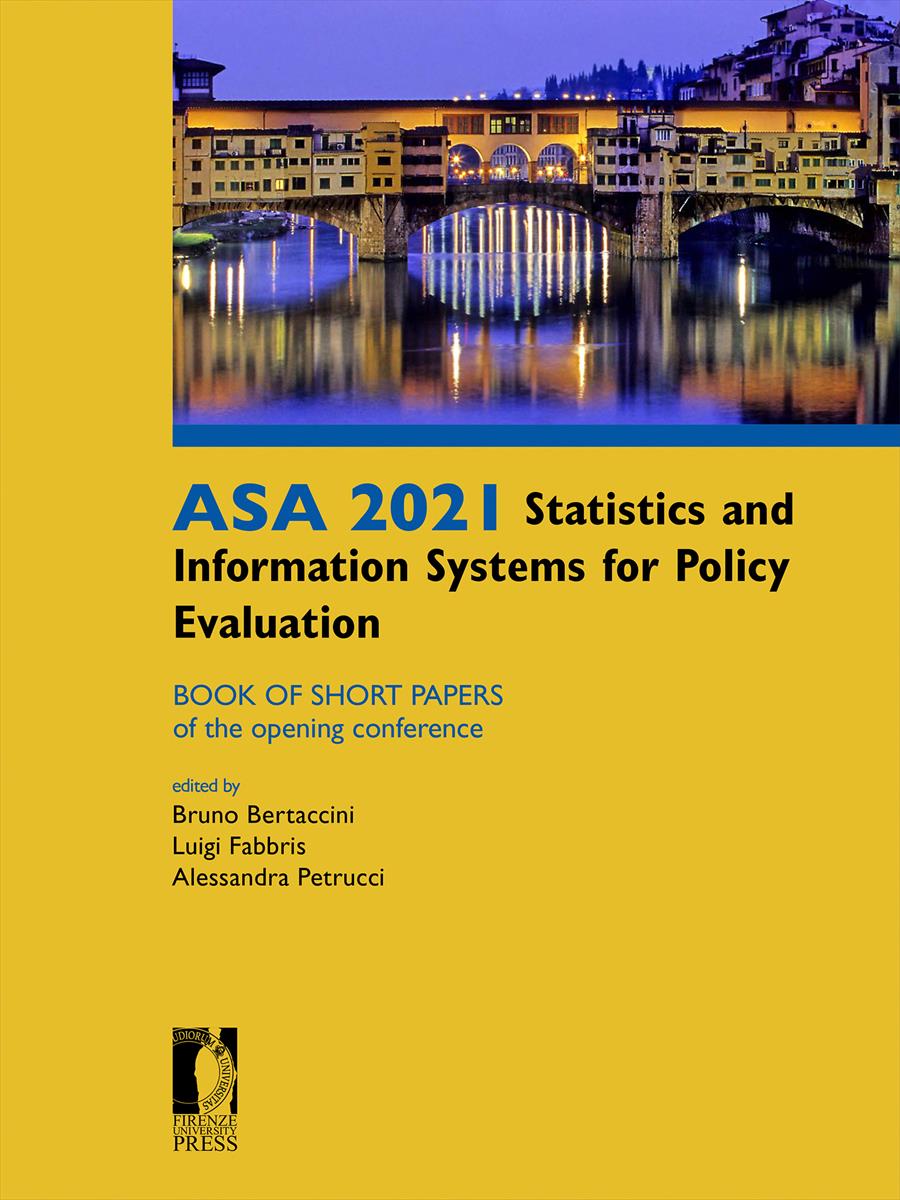- ASA 2021 Statistics and Information Systems for Policy Evaluation
- Edited by Bruno Bertaccini, Luigi Fabbris, Alessandra Petrucci
Life satisfaction of refugees living in Germany
- Daria Mendola
- Anna Maria Parroco
- © 2021 Author(s) |
- CC BY 4.0
- DOI: 10.36253/978-88-5518-304-8.20
Since 2015, Germany has been hosting noticeable incoming flows of refugees and asylum seekers, leading, in 2020, the ranking of European countries and being the fifth in the world ranking for the number of hosted refugees. Despite the quality of life of refugees is expected to be improved in the aftermath of their arrival to Germany, refugees are still facing several problems of integration and economic deprivation (e.g., about 90% are unemployed). Hence, it is a worthwhile exercise to study how satisfied they are with their present life. Using a sample of 3,408 individuals from the German IAB-BAMF-SOEP Survey of Refugees (regarding refugees and asylum seekers who came to the country between January 2013 and January 2016), we present some preliminary analyses on the life satisfaction (LS) of these vulnerable individuals. Particularly, satisfaction levels were arranged by quartile and an ordinal regression model was estimated to focus on the association among levels of LS and main socio-demographic characteristics. Syrians experience worst perceived quality of life (LS), such as older and higher educated people, other things being equal. Uncertainty, due to their legal status or to lesser support received by law, may explain that those with dismissed or pending asylum application are less satisfied than refugees. Family arrangements, as expected, has an impact, other things being equal, on the overall life satisfaction: the higher the number of co-residing household members the higher the LS; cohabiting partner of spouse affect positively LS. Noticeably, LS is positively associated with satisfaction in specific domains such as health, privacy in the current living arrangement, and neighbourhood safety. Interesting insights come out for policy design.
- Keywords:
- Well-being,
- quality of life,
- asylum seekers,
- IAB-BAMF-SOEP Survey,
- of Refugees,
University of Palermo, Italy - ORCID: 0000-0001-5723-7859
University of Palermo, Italy - ORCID: 0000-0003-3213-7805
- Amint, K., (2010). Determinants of Life Satisfaction Among Immigrants from Western Countries and from the FSU in Israel, Social Indicators Research, 96, pp. 515–534.
- Belau, M. (2019). The impact of the housing situation on the health-related quality of life of refugees located in North Rhine-Westfalia, Germany. European Journal of Public Health, 29(Supplement_4), ckz185-175.
- Berry, J.W. (2017). Theories and Models of Acculturation, The Oxford Handbook of Acculturation and Health, Edited by Seth J. Schwartz and Jennifer Unger. DOI: 10.1093/oxfordhb/9780190215217.013.2
- Brücker, H., Rother, N., Schupp, J. (2016). IAB-BAMF-SOEP-Befragung von Geflüchteten: Überblick und erste Ergebnisse (Vol. 29, p. 77). DEU.
- Busetta, A., Mendola, D. (2018). The effect of family networks on refugees health conditions. In: Giornate di Studio sulla Popolazione 2019, January 24-26, 2019 – Milan, Italy.
- Colic-Peisker, V. (2009). Visibility, settlement success and life satisfaction in three refugee communities in Australia. Ethnicities, 9(2), pp. 175-199.
- Cummins, R.A. (2000). Objective and Subjective Quality of Life: An Interactive Model. Social Indicators Research, 52, pp. 55–72.
- Gambaro, L., Kreyenfeld, M., Schacht, D., Spieß, C. K. (2018). Refugees in Germany with children still living abroad have lowest life satisfaction. DIW Weekly Report, 8(42), pp. 415-425.
- Georgiadou, E., Zbidat, A., Schmitt, G. M., Erim, Y. (2018). Prevalence of mental distress among Syrian refugees with residence permission in Germany: a registry-based study. Frontiers in psychiatry, 9, 393, pp. 1-12.
- Hendriks, M. (2015). The happiness of international migrants: A review of research findings. Migration Studies, 3(3), pp. 343–369.
- Hinger, S. (2016). Asylum in Germany: The making of the ‘crisis’ and the role of civil society. Human Geography, 9(2), pp. 78-88.
- Kogan, I., Shen, J., Siegert, M. (2018). What makes a satisfied immigrant? Host-country characteristics and immigrants’ life satisfaction in eighteen European countries. Journal of Happiness Studies, 19(6), pp. 1783-1809.
- Leiler, A., Bjärtå, A., Ekdahl, J., Wasteson, E. (2019). Mental health and quality of life among asylum seekers and refugees living in refugee housing facilities in Sweden. Social psychiatry and psychiatric epidemiology, 54(5), pp. 543-551.
- Nesterko, Y., Braehler, E., Grande, G., Glaesmer, H. (2013). Life satisfaction and health-related quality of life in immigrants and native-born Germans: the role of immigration-related factors. Quality of Life Research, 22(5), pp. 1005-1013.
- Phillips, D. (2006). Moving towards integration: the housing of asylum seekers and refugees in Britain. Housing Studies, 21(4), pp. 539-553.
- Walther, L., Fuchs, L. M., Schupp, J., von Scheve, C. (2020). Living Conditions and the Mental Health and Well-being of Refugees: Evidence from a Large-Scale German Survey. Journal of Immigrant and Minority Health, pp. 1-11.
- Schiele, M. (2020). Life satisfaction and return migration: analysing the role of life satisfaction for migrant return intentions in Germany. Journal of Ethnic and Migration Studies, pp. 1-20.
- UNHCR (2021). Refugee data finder. Available at: https://www.unhcr.org/refugee-statistics (01/21).
Chapter Information
Chapter Title
Life satisfaction of refugees living in Germany
Authors
Daria Mendola, Anna Maria Parroco
Language
English
DOI
10.36253/978-88-5518-304-8.20
Peer Reviewed
Publication Year
2021
Copyright Information
© 2021 Author(s)
Content License
Metadata License
Bibliographic Information
Book Title
ASA 2021 Statistics and Information Systems for Policy Evaluation
Book Subtitle
Book of short papers of the opening conference
Editors
Bruno Bertaccini, Luigi Fabbris, Alessandra Petrucci
Peer Reviewed
Publication Year
2021
Copyright Information
© 2021 Author(s)
Content License
Metadata License
Publisher Name
Firenze University Press
DOI
10.36253/978-88-5518-304-8
eISBN (pdf)
978-88-5518-304-8
eISBN (xml)
978-88-5518-305-5
Series Title
Proceedings e report
Series ISSN
2704-601X
Series E-ISSN
2704-5846
